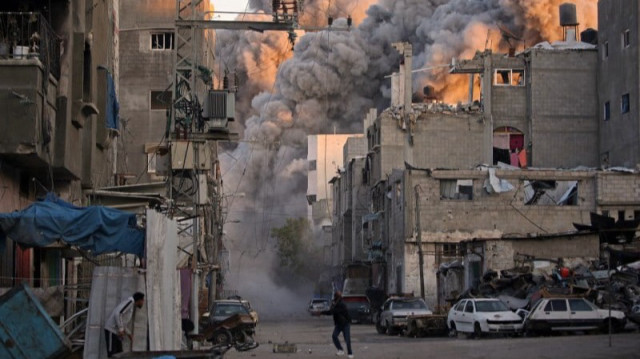
3-phase deal focuses on prisoner exchanges, Israeli troop withdrawal along with plans for Gaza's reconstruction and sustained calm
The world awaits the announcement of a landmark Gaza cease-fire and prisoner exchange deal between Israel and Hamas to end over 466 days of Tel Aviv's genocidal war on the Palestinian enclave.
The anticipated deal outlines detailed steps for phased implementation and long-term arrangements for Gaza.
- Israeli government approval process
The draft agreement will be presented to Israel's Security Cabinet, the broader government, and possibly the Knesset (parliament) for approval.
If approved, Israel's Justice Ministry and prison authorities will release the names of Palestinian prisoners eligible for freedom under the agreement.
Objections may be raised with Israel's Supreme Court, although such appeals have historically been denied.
Israeli President Isaac Herzog will then pardon Palestinian prisoners serving life or long-term sentences as required by the agreement.
However, not all prisoners included in the deal will be released simultaneously, as the exchange is structured in stages.
- Phases of the agreement
The deal will unfold in three phases, each lasting 42 days. However, Israel is reportedly negotiating to limit the agreement to two phases, according to a draft obtained by Anadolu.
* Phase 1: Humanitarian measures
This phase will last 42 days and focus on releasing 33 Israeli captives held by Hamas, both alive and deceased, including women, the elderly, and the ill.
The Israeli military, meanwhile, will withdraw from several areas in Gaza under its control.
The first release of Israeli prisoners will occur seven days after the cease-fire begins.
For each female Israeli soldier released, 50 Palestinian detainees will be freed, including 30 serving life sentences and 20 with long-term sentences.
For every civilian captive, 30 Palestinian detainees will be freed, including minors, women, and those with medical conditions.
* Phase 2: Broader negotiations
Beginning on day 16, this phase will focus on discussions for a comprehensive deal involving the release of all remaining Israeli hostages, including soldiers and civilians.
Negotiations must conclude before the end of the fifth week of the first phase.
* Phase 3: Reconstruction and stability
This phase will center on long-term arrangements, including rebuilding Gaza's infrastructure and establishing sustained peace.
- Cease-fire in Gaza
The cease-fire will begin on the first day of the agreement, with Israel withdrawing its forces from Palestinian residential areas and halting warplane operations 10 hours daily and 12 hours during prisoner exchanges.
A gradual withdrawal from Gaza will follow, including key areas such as the Netzarim Corridor, which divides northern Gaza from the south, and the Philadelphi Corridor along the Gaza-Egypt border.
In the second phase, a declaration of sustained calm will mark the cessation of military operations, a full withdrawal of Israeli forces, and the reopening of crossings for the movement of goods and people.
- Prisoner swap
In the first phase, for every Israeli civilian released, 30 Palestinian prisoners will be freed.
For each Israeli soldier released, 50 Palestinian detainees will be freed, including 30 serving life sentences and 20 with high sentences.
The agreement includes the release of 47 Palestinian prisoners who were rearrested after being freed in the 2011 prisoner exchange deal.
Israel has stipulated that prisoners serving life sentences cannot return to the West Bank, similar to conditions in the 2011 deal when such prisoners were sent to Gaza or abroad.
Negotiations will follow to determine the number of Palestinian detainees to be released in exchange for Israeli soldiers in the second phase of the agreement.
Palestinian detainees released under the agreement will not face re-arrest for the same charges.
- Israeli hostages
The agreement includes the release of all 98 Israeli captives held by Hamas.
The first phase will focus on 33 humanitarian cases, including women, children under 19, the elderly over 50, and civilians with medical conditions.
Soldiers will be released in subsequent phases, and the return of remains will be addressed in the third phase.
Israel currently holds more than 10,300 Palestinian prisoners, while it is estimated that 98 Israelis are detained in Gaza. Hamas said that many Israeli captives have been killed in indiscriminate Israeli airstrikes.
- Humanitarian aid to Gaza
From the first day of the agreement, humanitarian aid will be delivered to Gaza at a rate of 600 trucks daily, including 50 fuel trucks. Half of these supplies will go to northern Gaza.
The UN and other international organizations will oversee the distribution of aid throughout all phases of the agreement.
- Return of displaced Palestinians, reconstruction
Displaced Palestinians in southern Gaza will be allowed to return to their homes in northern Gaza from the first day of the agreement.
Reconstruction efforts will focus on repairing infrastructure, including electricity, water, sanitation, communications, and roads.
Temporary housing will include 60,000 mobile homes and 200,000 tents for displaced families.
The rebuilding process will also cover homes, civilian buildings, and other essential infrastructure.
- Guarantors of the agreement
Qatar, Egypt, and the US will act as guarantors of the deal, following weeks of intensive negotiations to finalize its terms.
The Israeli army has continued a genocidal war on Gaza that has killed over 46,600 people, most of them women and children, since Oct. 7, 2023, despite a UN Security Council resolution calling for an immediate cease-fire.
The International Criminal Court issued arrest warrants in November last year for Israeli Prime Minister Benjamin Netanyahu and his former Defense Minister Yoav Gallant for war crimes and crimes against humanity in Gaza.
Israel also faces a genocide case at the International Court of Justice for its war on the enclave.

